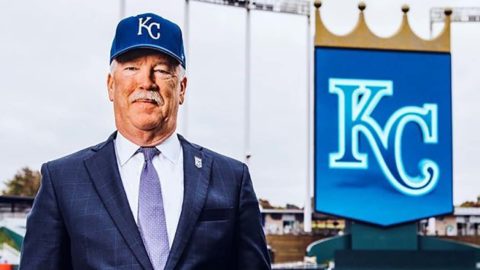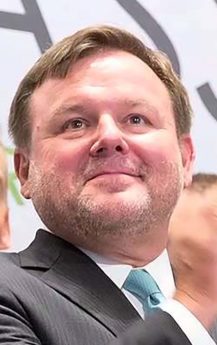HOME | ABOUT US | MEDIA KIT | CONTACT US | INQUIRE
HOME | ABOUT US | MEDIA KIT | CONTACT US | INQUIRE

Looking Good in Blue: John Sherman will be swapping out of his Cleveland Indians ownership stake as controlling owner of the Royals.
The energy sector provided financial muscle for the most noteworthy business deals of the year past. But there was plenty of activity on other fronts.
Companies of fewer than 500 employees account for 99.9 percent of the roughly 30 million businesses operating today. But when big deals take place within that remaining 0.1 percent, they can be … seismic.
The Kansas City region produced dozens of such transactions in 2019. Some were monsters that will rock the area’s business community for years, while others will reshape certain business sectors—banking seemed to be a popular M&A playground. And some might not make a big ripple in the business infra-
structure, but will definitely change the philanthropic profile and lifestyle choices for owners who cashed out.
Dollar-signs alone are probably not the best measure of the most impactful deals. In that regard the buyout of Tallgrass Energy by its largest minority stakeholder, Blackstone Group, slapped a $4 billion price tag on the company. That deal (more on the transaction below), is expected to close in the first quarter of 2020.
In terms of raw headline-making power, nothing in 2019 topped the announcement in August that longtime energy executive and civic leader John Sherman had assembled an investor team to acquire the Kansas City Royals from David Glass and his family. The price wasn’t disclosed, but Sherman has indicated that estimates of $1 billion to $1.1 billion were right in the, well, ballpark.
That deal didn’t just cement the historic community ties that date to Ewing Kauffman’s founding of the club in 1969. It deepened them. Sherman, who made his fortune in the energy sector’s mid-stream pipeline system, gathered roughly 30 investors with current or previous ties to the region.
Assembling the Team
The roster of family names involved reads like a Who’s Who of Kansas City Commerce: The Dunn, Lockton, Kemper families foremost, but also past icons including members of the Hebenstreit, Haverty and Atterbury clans, plus current players like Sherman’s long-time energy-sector wingman, Bill Gautreaux, Peter Mallouk of Creative Planning and his wife Veronica, Terry Matlack and Paul Edgerley of VantEdge Partners—even actor Eric Stonestreet. Somewhere, Paul Rudd missed an opportunity.
It’s an unusual approach to ownership in major-league baseball, but perhaps a harbinger of things to come, Sherman said.
“Teams are becoming more valuable, which is why the commissioner (MLB’s Rob Manfred) thinks what we put together would be a model for local ownership in small markets,” Sherman said. “They’re big believers in local ownership—not a lot of Steve Ballmers can write a check like that.”
So there’s no question, he said, about the group’s long-term commitment to Kansas City. “They are civically minded, and to David Glass’ credit, he wanted to sell to a group with a similar commitment made by Ewing Kauffman.”
And behind their commitment, Sherman said, there’s a great deal of business acumen. “People we knew expressed interest in this thing before, so we wanted the financial wherewithal to participate, first, but what we hoped for, and found overwhelmingly, was a sense of how important this was for people from Kansas City, people who have a love affair with the team and know how important the team has been to the community.”
He described most in the ownership group as “pretty hard-nosed business people, all are very successful growing their own business. They are tough negotiators, and all allocated value, 100 percent of them, to being part of the solution to keeping ownership of the Royals in the community.”
Asked whether the Kansas City business community presented a rare level of collaboration that helped bring the deal together, Sherman didn’t disagree. “I do think a lot of people in the business community here compete as well, but they collaborate and work on things together. I always felt we as a city punched above our weight class in that regard, as well as philanthropically and civically.”

By acquiring $3 billion in assets from a competing investment firm, Kevin Birzer’s Tortoise Capital Advisers ratcheted his Leawood firm’s total assets under management to roughly $25 billion.
Tortoise Capital Advisors
Hailing from the same capital source—energy transmission—Tortoise Capital Advisors executed the purchase of $3 billion in assets from Advisory Research, a subsidiary of Piper Jaffray Cos. Tortoise, which operated for the better part of the past decade a division of Mariner Holdings, said the deal would open up new lines of income-focused funds available to its clients.
The deal comprised roughly $1 billion in each of the fields where Advisory Research was playing—publicly traded closed-end funds, open-end mutual funds and institutional accounts. Kevin Birzer, CEO at Tortoise, said clients would be able to select from funds based on total return or focused on income—or both.
Based on where Tortoise stood at that point in the year, the acquisition pushed its assets under management to roughly $25 billion.

David Dehaemers founded Tallgrass Energy Partners in 2012, and by the time of its sale, that valued company at $4 billion, it was operating nearly 1,000 miles of oil, gas and water pipelines nationally.
Tallgrass Energy Partners
And, of course, the Tallgrass Energy deal, the biggest of the year, represented the pinnacle of a fast-paced enterprise-building effort by CEO David Dehaemers. The deal cost the Kansas City area one of its comparatively few remaining public companies; Blackstone and partner Enagas, a Spanish company, will take the company private when the deal closes later this year.
With his December 31 retirement, Dehaemers leaves behind a sprawling enterprise that owns and operates more than 9,100 miles of pipelines carrying crude oil and natural gas, the latter accounting for about 90 percent of that total. It also has more than 300 miles of water pipelines.
Tortoise Capital Advisors, by the way, was one of the largest institutional shareholders in Tallgrass, with nearly 19.3 million shares—10.75 percent of all outstanding—worth about $389 million as of the third quarter close.